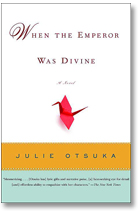Books |
When the Emperor Was Divine
Julie Otsuka
By
Published: Jan 01, 2005
Category:
Fiction
What happens to a first novel by an unknown writer?
Unless it is a lurid tale of Manhattan — featuring the nanny for the spoiled kids of a rich bitch, secretary to a high-powered editor, mistress of a corporate stud-muffin — a first novel enters the world as an orphan. The publisher can’t remember why it put the thing out. Bookstores don’t order it. Reviewers overlook it. Booklovers never hear about it. And, soon enough, off it goes to be pulped.
Julie Otsuka assumed that would be the fate of ‘When the Emperor Was Divine’ — even after a rave review from The New York Times.
But something remarkable occurred. Her first readers pressed the book on others, and the second ring of readers loved it and pushed the novel on their friends, and soon it was — no, not a bestseller — a cult favorite. "City Reading" programs in Carmel, Indiana and Topeka, Kansas and Santa Barbara, California chose the book. It became assigned reading for all freshmen at Utah State University and Simmons College.
Any minute now, Oprah is going to discover it and rocket this modest little story — just 160 pages — to the top of the paperback bestseller list.
What’s the fuss about?
To a certain extent, ‘When The Emperor Was Divine’ is simply the right book at the right time. It’s the story of a Japanese American family during World War II, starting with the father’s arrest for ‘treason’ in 1941 and ending in the spring of 1946, when the family is once again living in Berkeley, California. The novel was first published in 2002, so it was easy to grid America’s hatred of our Japanese enemies in World War II — and our uninformed hostility to the Japanese Americans living among us — onto our rage against the Arabs who masterminded the 9/11 attacks — and the Muslims who are our fellow citizens.
But that’s to do the book too little credit. For it’s an eminently readable little (160 pages, remember?) novel. No profanity. No sex. Just a simple story: father seized by the FBI, mother and two children sent to a camp, lots of displacement and loss and endurance, and then a reunion. Your 9th grader could handle this novel.
The characters have no names. The writing is flat, tight, controlled — what many of us think of as ‘Japanese.’ It’s not overly poetic (the first line is, ‘The sign had appeared overnight’). The mother is a portrait of courage. The kids do their best to help their mother get through the long days in their desolate internment camp in the Utah desert. And the father is, clearly, no threat to national security — this is a stylish man who buys his kids presents from Paris.
It’s a book very much about surfaces: sights and smells of trees and trains and wild horses. And of objects, present and not: ‘He woke up longing for a glass of Coke. Just one, with lots of ice, and a straw. He’d sip it slowly. He’d make it last a long long time.’ This kind of writing automatically creates a tension. For everything said, there is something withheld. We read on, eager for an explosion, a release.
But the thing about the internment of Japanese Americans in World War II is that there were so few outbursts. No violent camp riots. No mass hunger strikes. No cries of ‘Long live the Emperor.’ These people were, in the end, as American as they were Japanese; they had no loyalty to the Emperor, no belief in his divinity. At the same time, they had strong Japanese traits: they cared greatly about saving face and maintaining dignity.
So the shocks in ‘When the Emperor Was Divine’ come all at the end, in the final chapter. Many proclaim it brilliant. I’m not so sure. But that’s a conversation for your reading group — and I’m quite sure there’s one meeting right now to discuss this haunting little book.
To buy ‘When the Emperor Was Divine’ from Amazon.com, click here.


